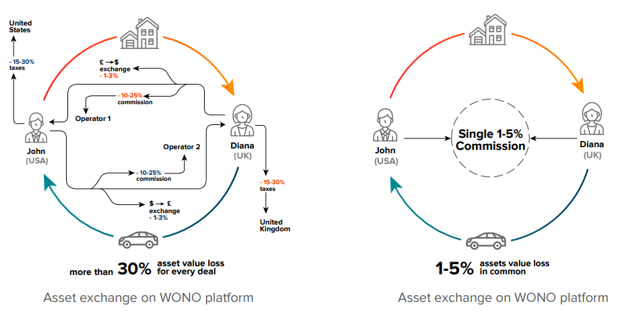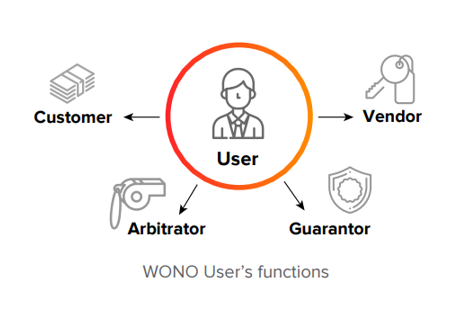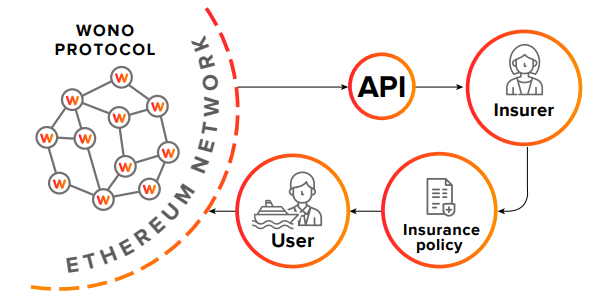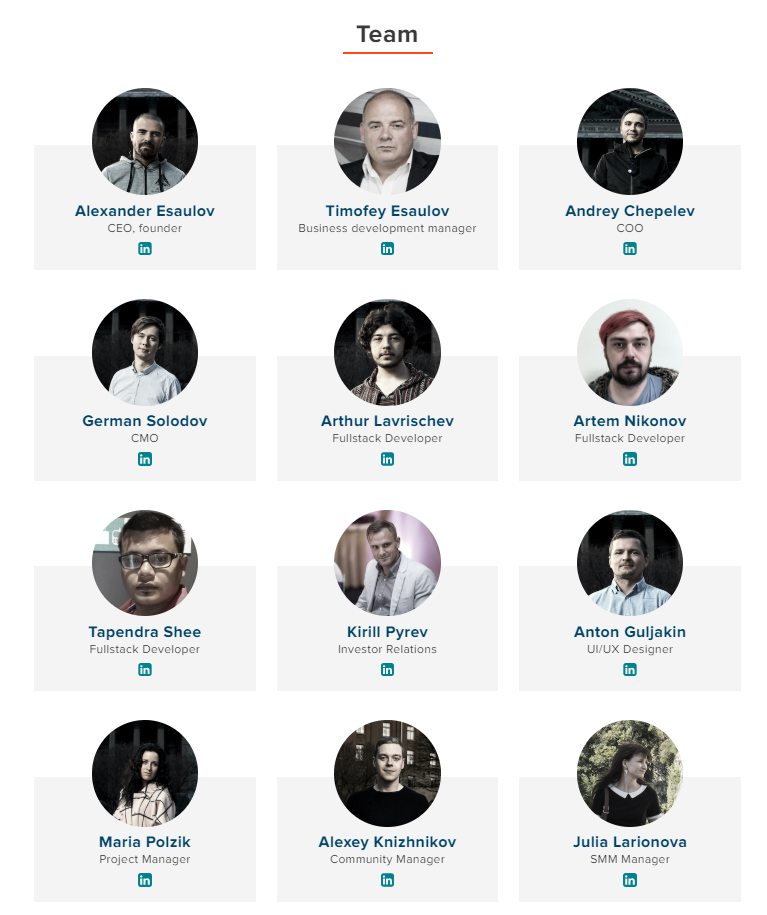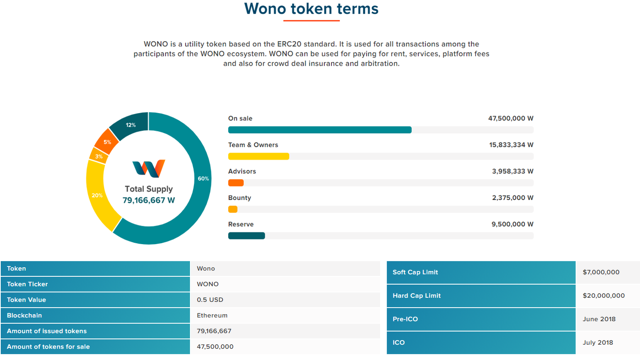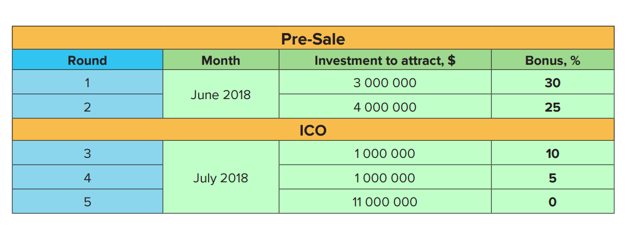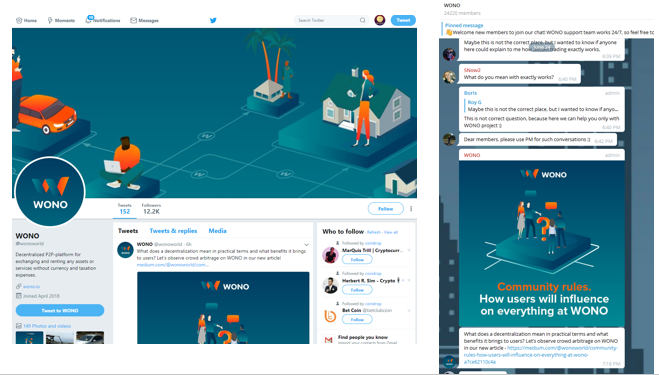Latest news about Bitcoin and all cryptocurrencies. Your daily crypto news habit.
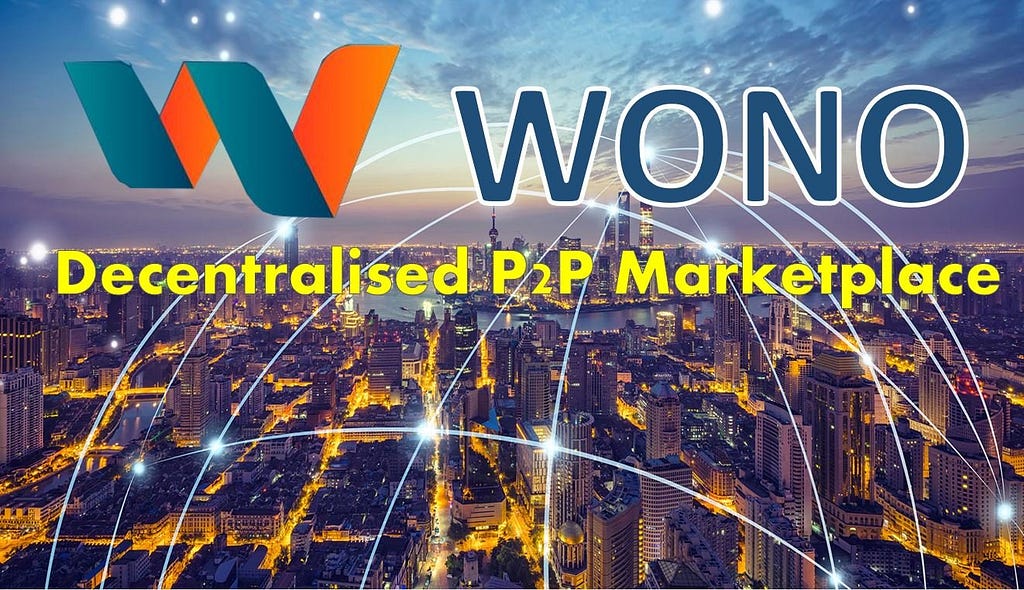

P2P (peer to peer) businesses are the new wave of businesses that are disrupting the world’s economy. Examples of P2P businesses that have risen to household names in the past decade include, AirBnB, Uber, and free lancing websites e.g. TaskRabbit, Freelancer, Upwork and more.
According to a report by PricewaterCooper in 2015, the sharing economy in 2014 generated a revenue of $15 billion and this is expected to increase to $335 billion in 2025. So it’s a huge market with a lot of growing potential. Juniper Research also reported the most promising sectors for sharing based economy currently are accommodation rentals (e.g. AirBnB), transportation (e.g. Uber) and services (e.g. freelancing work). These are therefore the main industries that WONO focuses on.
P2P businesses are significantly cheaper than P2B businesses, for example. Staying in an AirBnB is, on average, 60% cheaper than staying in a hotel. This is the main reason why many people choose to use with AirBnB.
However, the truth is, even that 60% discount is overpriced and can be reduced much more. The reason it is overpriced is because of the high commission rates that the middleman companies like AirBnB and Uber charges. These companies charge an average commission of 30–40% of the transaction. They can charge so much commission because they have monopolised the industry and have little competition. This forces the service provider or asset owner to charge significantly more fees to cover the high commission rates.
WONO presents itself as the solution to this growing centralisation. As a Blockchain project, WONO will only charge 1–5% commission and aims to reduce the cost to vendors and users greatly. It can charge so low, because as a blockchain project, all transactions are run by smart contracts, and so they bypass expensive middlemen companies (e.g. UBER or AirBnB) and allow the customer to liaise directly with the asset owner.
Another benefit of a blockchain project like WONO is that it runs on cryptocurrency, not fiat.
In most countries around the world, cryptocurrency is still considered a digital asset not money. Which means that all WONO tokens exchanged in the system, is not taxable until it is converted to fiat.
Furthermore, if token exchanges are done from private wallet to private wallet, and off a centralised exchange, there is no way for taxation offices to monitor earnings.
Which means that as long as the WONO tokens are kept within the private wallet, and not converted to fiat. The person earning will not be taxed. In certain countries such as Australia, the tax rates can go up to over 40%, so bypassing that cost is another major incentive for costs and charges to be the lowest in the world on WONO. To ensure that there is good use case for WONO tokens, the WONO platform is designed for several sharing industrues, including rentals, transport and services which are the most promising P2P industries as we mentioned above, but also miscellaneous assets of basically anything. Potentially, a user could even rent out his guitar or gym equipment for a day if they really wanted to.
Any user on the platform can play 4 different roles in the system.
- Customer — pretty self-explanatory, this is the party who pays WONO tokens to rent or hire services.
- Vendor — the asset owner or service provider
- Arbitrator — is the being a judge to settle dispute. Most deals on the system will be fairly straightforward, but if there is a dispute, the deal goes to arbitration.
The system itself has the capability to do automated arbitration for simple cases. E.g. The inability to finance a deal, after committing to it.
But in a case that is less straightforward, the case will go to “Open Arbitration”. An Open Arbitration is a process where other token holders are allowed to examine the case and vote for the outcome. Each arbitration will only have a 24 hours window period.
Arbitrators will be required to first fork out some of their own tokens to stake in the decision they believe to be right. And at the end, the larger number of tokens staked becomes the Concensus verdict of the community. Arbitrator who voted correctly, which will be the majority, will get their staked tokens back as well as get a reward from the commission.
Even though it sounds scary to stake your tokens, it is really a mechanism to prevent people from manipulating the system. Because the entire transaction is recorded on the Ethereum network, the transactions information are open to free access and in most cases, the verdict would be pretty clear. The staking is just to prevent any intentional malicious behaviour.
4. Guarantor — The guarantor is a special role of a neutral third party, who guarantees or assures the vendor and customer that the deal will be successfully completed. Each deal will have a guarantor attached who tries to ensure a smooth transaction.
It is important to understand that the guarantor in this case is not the same as a guarantor in secular businesses, because guarantors in businesses e.g. bank loans means they are insuring the worth of the asset. But in WONO, the guarantor is not insuring the worth of the asset, but insuring that the deal will be successful.
The role of a guarantor is quite important, because it ensures that whilst the whole system is run by smart contracts, there is a human oversight over each case. It’s like a safety blanket for each transaction. One of the main reasons why some people are afraid to use P2P business, is because they feel they cannot trust the promises made by the vendors. But WONO negates the risk but providing features such as a guarantor in place.
Guarantors will have to stake their tokens initially as well. But when the deal is successfully completed, they will get their stakes back as well as a cut of the 1–5% commission charged.
WONO will also have a reputation system.
This is a reputation that is built from several different factors, including approval and ratings from others, reliability, activity on the platform, with different weights attached to each of the different roles played, etc… This reputation will affect the amount of deal commission the user receives.
If you’re a gamer, think of this as levelling up your account to get bigger rewards.
Again, this is a smart feature to weed out malicious or poor quality users and promote good behaviour on the platform to ensure good and safe experience for users.
As mentioned above, the entire WONO network uses the Ethereum blockchain, and except for information that is crucial to the user, all other information is open but secure. Any assets that are listed on the platform must first pass through a proof of ownership procedure.
One of the only draw backs of the WONO protocol potentially is the insurance of physical assets e.g. homes or cars that have been rented out. WONO system can insure the deal, but not the assets. In other words, they can guarantee the deal will happen, but they cannot protect or guarantee that the house or car rented will not be damaged.
To cover this risk, WONO will be working with third party insurance companies to insure against this risk.
The insurance partners have not been announced yet, but in their whitepaper, they have stated they are working towards getting a 25% discount for insurance services, and they will also ensure that there will be minimal paperwork to ensure seamless issuing of policies. Keep your eye on this space.
One last feature to mention is that WONO offers data collection and depersonalised reports. This is a feature that combines Blockchain technology with AI (Artificial Intelligence) technology.
Users can agree to participate in a report-generating program. That program will collect their data to be used in a depersonalised way (so no identification) and the user will be rewarded for their participation.
That data will then go into a big pool of depersonalised data where an AI will analyse it, learn from it and make useful recommendations to business including market forecasts, preferences of users e.g. users who rent in that particular area have been noted to have a preference for Japanese culture, so decorating a property that way might result in a higher likelihood for successful deals in the future etc..
If you’ve read our NCASH or URP reviews, you would know this report generating service is a very sought after service and lucrative. And blockchain and AI combined technologies do a very good job in collecting, protecting and processing the information. Beyond the marketplace, this is potentially a very attractive feature of the project.
The WONO app itself will be a very easy to install and use and it will be available on all devices. It will also be compatible with login from all major social media platforms e.g. google, facebook, twitter, Instagram etc..
This is the team behind the project.
Their CEO is Alexander Esaulov, an entrepeuner and marketing expert. He has previously founded successful start-ups such as Greeder (products market place), Alex games and Burn to Earn (fitness reality shows) and SPb Fighters (MMa reality show).
Their COO is Andrey Chepelev who is currently also the Editor-in-Chief and project manager at Koelsa.ru. In 4 years, he raised the website’s monthly audience from 0.7 million to 2 million viewers and developed it from a small regional media into the number 5 automative media site in Russia. He also previously worked with Alexander at Alex Games and Burn to Earn.
You can go through the rest of the team’s resume yourself, it’s a young team, but the roles and experience are well balanced between marketing and tech developers. In fact, they might be the first blockchain project that’s more marketing/ business heavy in leadership that I’ve seen. Which may go well in the currently blockchain space, where marketing is often neglected.
They have 5 advisors, who have a wide range of expertise ranging from blockchain marketing to legal advice to accommodation and travel expert. These are all guys with lots of experience and success in their various fields. Looks like a solid board of advisors.
This is their roadmap. It’s a long roadmap that goes until Q2 of 2020.
Most of 2018 will be developing their technology and services. Q4 when the WONO protocol will start publishing, so that’s what I would consider their MVP (Minimal viable product). An MVP is important to any Blockchain project, because it proves to the world that their technology is viable. An MVP significantly lowers the risk of investing in a project.
However, in a utility project like WONO, because the technological demands are not that high (as opposed to a protocol project for example), it is often assumed they will be able to deliver on the MVP. The more important fundamental to pay attention is their market penetration, partners etc..
Q1 of 2019 will be the launch of the WONO API, and Q2 2019 is the launch of the WONO trial version. It is only in the Q1 of 2020 that we will see the launch of the partner program, product strategy updates etc…
So buying now would mean quite a long HODL. But it also means we’re getting in early at a very big discount. It all depends on how much you believe in the project and what kind of investor you are.
Rounding up with a look at their token mechanics.
The ICO fundraising will be selling 60% of their total tokens. That’s quite a big proportion, usually it is only 30–40% that is sold. The significance of such a large percentage in this case actually means a lower marketcap when they are launched. For example, the hard cap (so maximum amount to be raised) of the fundraising is $20 million. If the tokens sold was only 30%, then the estimated marketcap when they hit the exchanges would be over $60million. However, because the $20 million hardcap is 60% of their total, even if they reach hard cap, their initial marketcap when they hit the exchanges would only be $36 million. That’s very small marketcap for a multi-billion dollar industry. Which means there’s a lot of room to grow. In addition because it’s already 60% of total supply release, there isn’t any plan to release more tokens or further dilute the circulating supply anytime in the near future.
Each WONO token will be worth $0.50 USD, so overall, I feel this is an attractive entry price is for an ICO of the low marketcap.
The fundraising will take place over 5 rounds, the first two rounds will be pre-sales. The private pre-sale is already happening right now, and is offering 30% bonus. That’s a big bonus. The public sale hasn’t been announced yet, but according to their whitepaper, it is expected to be this month in June, so we can expect it sometime soon.
The ICO will take place in July, 3rd and 4th Rounds will have a bonus of 10 and 5% respectively, but only a million dollar sale. The bulk of over half the tokens will be sold in the 5th round with no discount.
Usually with big discounts over 25% there is the risk of dumps when the token hits the exchanges. To prevent this from happening, all bonuses that exceed 15% will be paid in parts, the first 15% of the bonus will be received on the first day and the remaining 15% will be received 2 months later. This staggered distribution is a common strategy to avoid dumping, and it’s good to see the team addressing this potential problem. Furthermore, more than half of the tokens sold will be sold in a single round 5 with no bonus, so the proportion of investors receiving the bonus is actually not that big, which is reassuring that we shouldn’t see a dump. I think the token mechanics of this project is healthy.
Their twitter has over 12k followers and their Telegram group has over 24k members. This is very huge for a project that hasn’t even hit public pre-sale. Social media numbers are important to note for ICOs, because the bigger the social media community, the more likely they will hit their hardcap and also the more likely the token will see a surge when it first hits the exchanges, as due to regulations and other factors, it is likely there will be a lot of people who are aware of this project but unable to participate in the ICO. With the big numbers in their social media already, I think this project should have no problem hitting their hard cap.
In conclusion, I think WONO is a project with alot of potential. Things I would pay attention to moving forward, include partnerships, their MVP at the end of the year and the 3rd party asset insurance.
The P2P market is a very fast growing and lucrative industry, and I think moving forwards we will see a lot of blockchain projects come up in this space. We’ve already seen some other recent projects like Blue Whale come in the space. Blue Whale is a very good P2P Blockchain project focusing on the freelancing community. WONO goes a step further in scope to include not just free lancing but rental, transport and miscellaneous P2P businesses as well. It is an ambitious project that is taking on giants such as AirBnB and UBER, and the amazing thing is why not? In an industry where people are using those services because they are cheap, WONO offers an even cheaper option by 30–40%. Simply because of the discount, people will pay attention to it. Furthermore, it is non-taxable in many countries and has multiple features to insure or safeguard the quality of transactions. I think WONO is a project worth paying attention to.
Let me know in the comments section below what you think of WONO. If you found this post helpful, give it that clap so others can find it too.
Have a fantastic day ahead, and I will catch you guys again very soon!
WONO a Decentralised P2P Marketplace taking on AirBnB and Uber was originally published in Hacker Noon on Medium, where people are continuing the conversation by highlighting and responding to this story.
Disclaimer
The views and opinions expressed in this article are solely those of the authors and do not reflect the views of Bitcoin Insider. Every investment and trading move involves risk - this is especially true for cryptocurrencies given their volatility. We strongly advise our readers to conduct their own research when making a decision.

